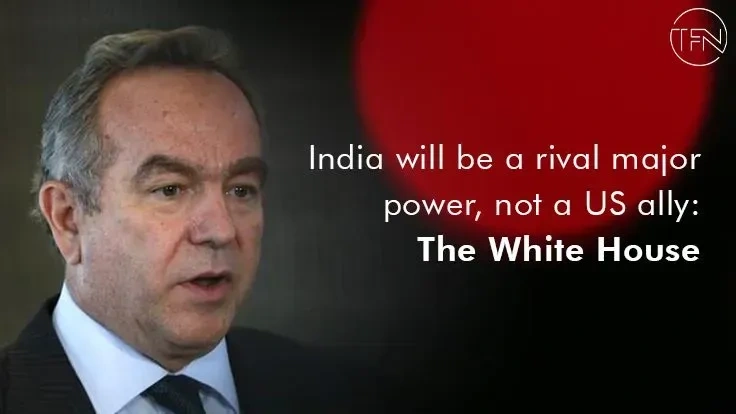
It is difficult to envision the US advocating its interests in Beijing, Berlin, Moscow, or Tokyo without an ambassador for two years. The American ambassador's home in New Delhi, Roosevelt House, hasn't had a resident since January 2021, which is the longest vacancy on record.
There is no lack of discussion in Washington highlighting India's significance to the country. It is "one of the most crucial partnerships" for the US, according to President Biden. But if, as the president said, India is an "indispensable" ally of the United States, why did he let the post of ambassador to India be unfilled for over two years?
American ambassadors to India have often contributed significantly to improving ties between the two nations. When China attacked India in 1962, John Kenneth Galbraith served as the American envoy. Galbraith, who was friendly with Prime Minister Jawaharlal Nehru and was close to President John F. Kennedy, played a crucial role in securing US weaponry shipments to India.
Nehru had previously responded coolly to American advances. Galbraith transformed Indian perceptions of America and forged a bond between Kennedy and Nehru by acting quickly to help India. The United States' backing for India in 1962 would prove to be a turning point in their relationship. In India, Galbraith is still a well-liked personality.
India and China still have a lot of issues. They each have nuclear weapons, share a 2,100-mile border, and claim areas that the other nuclear power now controls. In Nepal and Bhutan, which have traditionally been Indian domains of influence, China has been gaining power.
Beijing and New Delhi maintained a chilly peace for many years, but the rise of abrasive nationalism in Xi Jinping's China and Narendra Modi's India finally resulted in border clashes in 2020 that resulted in the deaths of several Indian and Chinese troops.
More recently, on December 9, tensions increased as a result of fighting between Indian and Chinese soldiers on the hilly border close to Arunachal Pradesh, which China refers to as South Tibet. Following joint military drills between the US and India last month along the India-China border, relations between China and India have further deteriorated.
The Biden administration has also ramped up attempts to strengthen collaboration with the informal security alliance of India, Australia, Japan, and the United States known as the Quadrilateral Security Dialogue, which tries to oppose China's ascent and is seen negatively by Beijing.
America and India have become closer due to the common threat posed by China. Republican and Democratic administrations have considered India a crucial ally in the American plan to control China during the last 20 years.
The National Defense Strategy report of the Biden administration recommends strengthening India's capacity to thwart Chinese aggression "and secure free and open access to the Indian Ocean area." Rare bipartisan support exists for American backing of India's progress, which makes the lack of a US ambassador there all the more puzzling.
Greater American involvement with India, which just overtook Britain as the world's fifth-largest economy, is warranted for important economic reasons. India is still one of the world's poorest countries in terms of GDP per person ($2,200), but it is one of the major economies with the quickest growth rates and a crucial market for commerce and investment.
India is a significant global provider of medicines, particularly vaccinations. Around $45 billion in US direct investments were made in India in 2021. American businesses have started looking for manufacturing centers outside of China as anxiety about China's disproportionate influence in global supply chains grows.
According to JP Morgan, Apple may manufacture 25% of its iPhones in India by the year 2025. Support from the US Embassy will be required for American businesses wanting to enter India.
India also contributes significantly to complex international debates on issues like technology policy, climate change, and global health. According to Richard Verma, who served as the US ambassador to New Delhi under President Obama, India was crucial to achieving a deal on the Paris climate agreements. Verma assisted in arranging a few of the first encounters that sparked dialogue between the leaders of India and the United States.
India and the US reached an agreement on significant policy choices including the climate agreements. However, an ambassador is crucial in negotiating the specifics of trade and military accords based on personal connections in bilateral discussions.
India took over as the Group of 20's head in December and wasted no time in positioning itself as a mediator who upholds a rules-based international system. S Jaishankar, the foreign minister of India and perhaps one of the most gifted international diplomats working today, represents India on the international scene as a responsible nuclear state, steadfast in its opposition to terrorism, and a force for good in the world.
Ambassadors have played a crucial role in giving Washington objective evaluations of the internal situation in India, which is now more important than ever.
Since he was elected in 2014, Modi has worked to make politics more Hindu-majoritarian, centralized control over the executive branch, and shut down political opposition. The Modi government has never stopped attacking minorities, press freedom, and the independence of the courts.
Diplomats are the government's eyes and ears on the ground and give accurate evaluations of the political climate of the host nation. Ambassador Galbraith, Chester Bowles, Daniel Patrick Moynihan, and Frank Wisner were able to provide an insightful and nuanced evaluation of the direction of the nation. The US will need to constantly evaluate how closely India and the US still adhere to liberal democratic norms.

